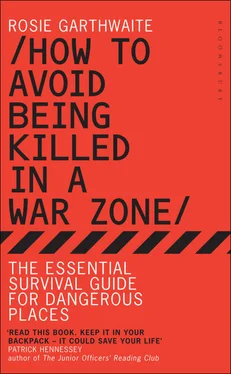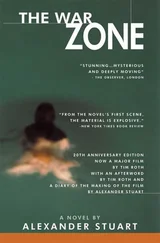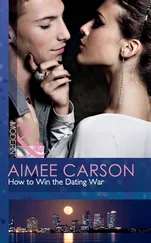This same thing might happen to you, so the first lesson is to trust your instincts. So many people I know are nervous of using the medical knowledge they learn. Nervous they will get it wrong. Nervous they won’t remember how to do anything.
Inside hot classrooms after long cold runs in the rain I nodded sleepily through most of my Red Cross training. I had regular updates throughout the year, and thought little had gone in. But two months later, when I was in a car accident in Botswana, I managed to whimper Red Cross instructions to my 12 injured friends while passing in and out of consciousness myself. They hopped into the next car that would take them, and I was left with two friends to wait for an ambulance. I couldn’t move my legs, so we refused several offers of a lift from passing farmers. Dehydrated, concussed and sick with pain from my crushed back, I wanted a doctor with a proper stretcher. It was like holding out for a London ambulance on the edge of the Okavango Delta. Silly. The ambulance did come eventually and four nurses each grabbed one of my limbs and threw me into the back of their dirty van. I thought I would never walk again, but I did…the next day.
The point is that, even in the direst of circumstances, these few pages of medical advice will come back to you. And even if you recall just one paragraph, you could help save someone from worse injury or even death.
I have tried to keep the information brief. Where common sense seems too obvious to mention, I have left it out altogether. I am no doctor, but I have had a few of them look over this text for me.
Warning:You might go out alone, but you are likely to find yourself working or at least living with others if you are in a dangerous place. It is essential that you tell those around you how to deal with any health problems you have: diabetes, asthma, allergies, heart and blood-clotting problems are some obvious ones. As the leader of a team, it is a good idea to start any trip by asking about any health problems amongst your group (see also On the Way In). You need to know how to use your own medical kit and any special medical treatment or equipment belonging to the people around you.
This is a contentious subject. Everyone has a different opinion about what is important. But a medical kit, however small, can help you survive. Keep it packed at the bottom of a grab bag (see Grab Bag YOUR GRAB BAG MUST INCLUDE…
), full of other essentials, such as your phone and ID, and check it before each trip.
Your kit should contain:
• Pain relief – aspirin in case someone has a heart attack and non-aspirin for other forms of pain, as some people are allergic and aspirin should not be given to people under 18.
• Water sterilization tablets – to be used when boiling suspect water is impossible (see How to Purify Water).
• Antibiotics – enough for a week’s full course. These can be difficult to get in some places, so they’re worth hoarding when you find a country that sells them without a prescription. Check the expiry date. If giving them to someone else, always ask about allergies, e.g. to penicillin. It’s worth knowing that the names of penicillin-type drugs usually end with ‘cillin’ (for example, amoxicillin, flucloxacillin) so if you can buy something that sounds different, it might be useful for those who are allergic. But check any packaging information first.
• Antihistamine – in cream and pill form, for rashes or insect bites.
• Antiseptic – cream, liquid or spray, or iodine or alcohol wipes. If you choose something like TCP, it can double up as a throat gargle.
• Diarrhoea pills – useful for desperate moments, especially when on the move.
• Salt tablets – to replace all you lose in an injury, or after a long active day when you have perspired freely.
• Butterfly stitches – to hold large wounds in place.
• Plasters and bandages – of all shapes and sizes, plus some sterile gauze pads. Tampons and sanitary towels can also be used to cover wounds: you need enough plaster or sticky tape to hold them in place.
• Vinyl or latex gloves – to avoid introducing infection while you are dressing wounds and to protect you from blood-borne infection, such as hepatitis B. Could also be used short term to keep dressings on fingers and feet dry.
• Condoms – can be used to keep fingers and feet sterile and waterproof for a short period of time. Also useful as portable water carriers or party balloons.
• Small scissors – people never seem to have them when you need to cut plaster or clothing.
• Malaria tablets – I have often skipped these and been lucky enough to avoid getting ill. I have always argued that the side effects outweigh the danger. Here, however, I defer to the advice of Dr Carl Hallam, who has worked in some of the most festering malarial bogs:
‘Take anti-malaria tablets. Europeans do not do well with Malaria falciparum (severe malaria). They can die in 24 hours because they have no resistance. It adds hugely to the workload of doctors already burdened with dealing with other problems locally. If you really feel you can’t take anti-malarials, then take the malaria cure with you [see Malaria]. But you need to learn how to take it and be confident in your diagnosis.’
This view is reinforced by Leith Mushtaq, who told me: ‘It’s not just bullets that can kill you – a mosquito can too.’
To the list above you can add all the extras you might need: asthma inhalers, pills and potions for the relief of cystitis and thrush, an extra pair of reading glasses, blister treatments… These are all things that some people cannot live without.
There are, of course, other medical preparations you need to make too, as outlined in Chapter 1 (see Before you Leave Home).
Step 1: Call for help
In a medical emergency you should always call for help, but don’t hesitate to treat the patient if the injury is serious. If you are alone, carry out the first few checks (see A BC – the first checks) and any necessary immediate treatment, such as stopping the flow of blood, then call for help. If the heart has stopped, do CPR (cardiopulmonary resuscitation, see CPR for adults) for one minute, then pause to call for help.
Normal vital signs

Remember that in serious medical emergencies you are really an assistant to the doctors who are on their way. You need to take a mental or even written note of any changes in your patient. If you administer drugs, note how much and when.
Step 2: Work out if it’s safe for you to help
Consider the following before you start giving help:
• Are you in the middle of a motorway with cars streaming by?
• Is there a battle going on around you?
• Is the vehicle the injured person is in stable?
Is the engine off?
• Is what just happened to your patient likely to happen to you?
• Is there a chance any fire might spread?
• Is there someone nearby who can help make it safe for you to work with the casualty?
Always be aware that what has happened to your patient could happen to you.
ABC – the first checks
ABC stands for airway, breathing, circulation. Always check these things if the casualty is unconscious, otherwise it’s not necessary: the casualty will be talking to you and it will be obvious what is wrong.
Читать дальше





![Джонатан Димблби - Barbarossa - How Hitler Lost the War [calibre]](/books/385421/dzhonatan-dimblbi-barbarossa-how-hitler-lost-the-w-thumb.webp)







